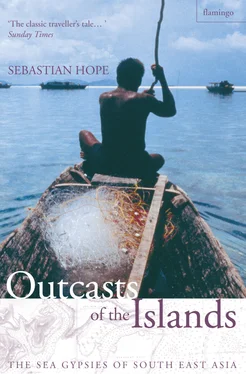On our fishing trips in the dug-out I had worked my way up from baler to net-boy already. Sarani began to pass the pole to me more often while he prepared a quid, or caulked the canoe, or worked on the net. Then came the day at Kapalai when he let me get into the water for the first time.
I had always been a tourist on the reef before then, as a diver or a snorkeller, and as a diver you are taught to touch as little as possible and take nothing. My instructor in Cairns had made it clear: ‘ “Take only photographs and leave only footsteps” except underwater, if you know what I mean, and then you don’t want to be walking on the coral, so no footsteps at all actually.’ The reason Sarani did not walk on the coral was because he was barefoot. He certainly had no qualms over bashing it about a bit, rattling his new spear into holes and crannies or excising a giant clam. I soon quashed the reluctance that came with putting on my mask and snorkel and collected shells alongside him.
We were covering areas of the reef which a sightseer would ignore, the zone of sea-grass and scrubby coral that grows in lumps from a bed of sand; we were not in search of beauty. I knew what I was looking for, but I was not entirely sure where I would find the shells. I stayed close to Sarani as he combed the sea-grass, pulling the canoe behind him. He would reach down and the first I would see of a kahanga or a téhé-téhé was as his hand brought it up through the water. The dolen were easier to find, scattered on the sand between the coral heads, though a surprisingly high proportion of the shells were occupied by hermit crabs. After I found my first kahanga , my eyes became accustomed to their shape and I found many more. The urchins were more elusive, covering themselves with a camouflage of vegetable matter, so that you had to look for an unnatural agglomeration of sea-grass fragments rather than for the creature itself. I made a considerable contribution to our day’s haul.
The new spear came into action to good effect against porcupine fish. One of the many strange fishes that employ methods of defence other than flight or shoaling, the porcupine fish inflates its body when threatened, thereby erecting the spines with which it is covered. Obviously this strategy offers no protection against an attack with a spear. Sarani stopped the blow short, so that it was a jab rather than a lunge, and the porcupine fish would obligingly immobilise itself. His second strike speared the fish. He took three. They plopped into the canoe spurting water through the spear holes and deflated like beach balls in a rock pool. We ate all three, boiled, for lunch.
I was at a loss as to how to eat what appeared to be a plateful of spines, and puffers in general are renowned for their toxic viscera. I waited for Sarani’s lead. He kept the spines towards the front of his mouth, cleaning them of flesh one at a time, turning them around with his lips. Not having teeth seemed to be an advantage. A sharp end would poke out at intervals and when the spine finally emerged, I recognised it instantly as the mysterious object I had found on tropical beaches in the past. I collected a handful once and they reminded me of a set of jacks, or of those fiendish anti-cavalry devices that, no matter how you scatter them, always land with a point sticking up into the air. Or into the roof of your mouth, your tongue, your gums, your lips. There was a knack to eating porcupinefish which was eluding me, and what I did manage to get off the bone had a very strange texture, fatty and elastic. It tasted surprisingly good.
Nightly visits ashore also became part of the routine for Sarani and me. Our first trip had had purpose – to find a haft for the spear point I had bought in Semporna. On subsequent nights, our visits to the island became social calls, a way of filling time before the boat needed propping up, the tide drying close to midnight. If he felt guilty about deserting his family for a while, he expiated it by coming back with treats – packets of crunchy snacks for the children and a bottle of Coca-Cola, decanted into a plastic bag, for Minehanga. She would wake on our return and drink it on the spot through a straw she kept for the purpose.
Mabul is not a large island; it can be circumambulated at a stroll in half an hour. On occasion our path would take us through the Sipadan-Mabul Resort’s compound, though it made me nervous. It felt like stumbling across Las Vegas after years in the desert, the lights, the music, white people sitting at tables in the open-sided dining room eating meat and salad, drinking beer and Australian wine and Scotch. I have been a holiday-maker in such places often enough, but in Sarani’s company I felt alienated from my own people. I would keep to the shadows as we passed, until the night Robert Lo spotted me.
‘So you made it.’ The dislocation from the place and circum stance of our first meeting made this reunion surreal: from the noise-filled hall of Earls Court, to a balmy tropical night on an island with a fraction of the floor-space; from suit and tie to shorts and a T-shirt. He had looked more at home in a suit. Sarani put on his confused old man act in Robert’s presence and excused himself to keep an appointment he had made to massage a shopkeeper’s wife. Robert was busy with some Taiwanese guests and took me over to the table where two of his diving instructors sat.
Sam and Tim were both English. Both had long sun-bleached hair and the sort of incidental tan that comes from working outdoors in the tropics. Robert introduced Sam as Samantha and she chided him – ‘only my Gran calls me Samantha’ – in an unmistakably Yorkshire accent. Tim was as Cockney as Bow Bells. If anything I found them more amazing than they found me when I told them what I was doing on their doorstep. ‘You mean those dirty old boats out from the village? They use fish-bombs, don’t they?’ They were relieved to hear that my hosts only used nets and spears. They saw the damage that was being done to Kapalai close-up and on a daily basis. That morning Tim had taken a group to a spot known for its beautiful coral and bizarre fish life, and he had found a pile of rubble.
Sarani returned and was sitting with some of the resort’s boatmen on a bench under the palms in front of the restaurant. Sam was keen to meet him and meeting her put a twinkle in his eye. I acted as translator. He was very surprised to hear that she was unmarried and was working here as a diver. ‘Does she go diving at Sipadan? Are there many fish?’ Sam went to get a fish-identification book from the resort library. It was a treasury, every species illustrated with a photograph of a specimen in its habitat. Sarani’s eyes lit up at the pictures of sharks and I told him Sam had seen four different species on one dive alone, including oceanic hammerheads. ‘He says if they catch one of those they are rich for two months. If they catch two, a son can get married.’ Sam’s expression dropped a little when she realised Sarani had at one time or another dispatched examples of most of the species in the book. ‘We saw dolphins today at Sipadan as well. Tell me they don’t catch dolphins.’ I could not, and I could not lie; Sarani accompanied his explanation of how to harpoon a dolphin with hand gestures. She took it well. She saw the difference between traditional hunting and commercial exploitation, but when Sarani turned the page to the rays I though better of telling her how much he could make from a manta. Tim stopped by on his way to bed. ‘What’s he doing, reading the menu?’
I was not keen to foster relations with the resort while we were at Mabul – I felt closer contact might taint Sarani and would certainly tempt me – but he was very taken with Sam. Of more immediate concern was our continuing run of poor catches from the deep-water nets. And then the engine failed. Pilar diagnosed a worn-out valve. Going to Semporna would have meant a trip in Pilar’s boat without enough sea produce to cover the cost. Sam suggested we go on the resort’s speedboat which was making a run in the morning. Tim had a day off and decided to come with us.
Читать дальше












